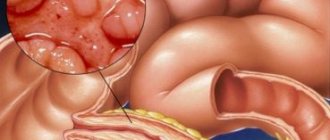Psychosomatics of the stomach is one of the first places in the list of possible causes of its diseases.
The human body and its emotions are closely connected. Many diseases take their origins from personality traits. Severe nervous tension can provoke a large number of pathologies, and most often they are stomach diseases. The digestive system is not able to fully function under constant stress. The failure does not occur immediately, so it is quite difficult to notice the onset of severe changes.
Psychosomatics: stomach
When the stomach hurts, it is psychosomatics that most often becomes the cause of trouble. The term implies an inextricable connection between the emotional and organ principles of a person.
Psychosomatics explains any indigestion due to the overly strong influence of negative emotions. Therefore, it is necessary to carefully monitor everything that the brain perceives and consciously limit any negative information.
Most often they affect silent and uncommunicative people who prefer to experience everything within themselves. They are the ones most often affected by various psychosomatic diseases. As already mentioned, the stomach is one of the most noticeable places in them. The more people chew unpleasant information, the greater its impact on the digestive system.
If emotions are also not expressed and rejected, the gastrointestinal tract, starting with the esophagus, is subject to severe influences. The human body is screaming for help, and if the individual does not provide it to himself, then pathology may develop.
Self-help methods
When analyzing the psychological factors of discomfort in the stomach, remember how the disease began. What happened or who appeared in your life then? What did you not want to accept? Sometimes we understand with our minds that we need to understand someone or change our minds, but we cannot do this. You will need the help of a psychologist. True, there are ways that help you cope with any problem yourself. One of them is Spiritual Integration. This is a method developed in Russia, its author is Konstantin Dovlatov . This technology allows you to find the causes of diseases and problems. Usually they arise in some situation that we have had difficulty enduring. For example, in childhood a child was scolded for expressing his opinion, and then, as an adult, he does not know how to negotiate and in an unpleasant situation his stomach begins to hurt.
Psychosomatic indigestion can be associated with many other reasons. With the help of Spiritual Integration, they are easily detected and worked through. A person begins to look at his problems more easily and see how to solve them. A pleasant side effect of such treatments is that many diseases associated with mental causes go away.
How does the psyche affect health?
Many emotions entail muscle tension, which can be so strong that it causes, as psychosomatics explains, pain in the stomach, because not only striated muscles react, but also smooth muscles.
The more a person tries to suppress his negative feelings, the more pronounced the body’s response is. Gastritis, peptic ulcers and even oncology are largely provoked by psychosomatic factors.
Scientists believe that the occurrence of diseases is explained by the desire of the stomach to digest not only food, but also any information coming from the outside. If it causes unpleasant emotions to a person, the organ immediately responds to them with special physiological reactions.
Treatment
No pills or injections will help until a person realizes and admits the problem. Treatment depends on the underlying cause. If passivity and anxiety are to blame, then you need to fight it. If the issue is a lack of psychological flexibility, then with that, etc. To determine the exact psychological cause of stomach illness, it is better to visit a psychologist. A specialist will help identify conscious and subconscious reasons. It will also determine the strategy and tactics of treatment.
For a complete cure, you need to change your thinking, get rid of negative attitudes and, of course, give vent to your emotions. Indecision, anger, irritation, fear, envy - all this corrodes the gastrointestinal tract. The work will take months, perhaps years. But you can speed up the process if you undergo a course of psychotherapy. Among the methods of psychotherapy, psychoanalysis, hypnosis, neurolinguistic programming, auto-training, and cognitive behavioral psychotherapy have a positive effect.
It is important! Despite the psychosomatic roots of the problem, medication is indicated. This can be either anti-symptomatic therapy to alleviate the condition, or restorative therapy. Only a gastroenterologist can prescribe treatment and select a medicine. In the absence of organic lesions, medications can be discontinued.
Psychosomatic causes of stomach diseases
Unhealthy experiences sooner or later lead people to change the functioning of the entire digestive system.
Stomach ulcers are most often caused by:
- suspiciousness;
- alertness;
- hypochondria;
- low self-esteem;
- ill will;
- desire for competition;
- tendency to resist;
- longing, etc.
Gastritis most often occurs due to the inability to submit to the situation, constant stress about a job not done well, and anxiety. Long anticipation of troubles, an inferiority complex, and fear of the future also often become the causes of the development of the disease.
Heartburn can be caused by constant dissatisfaction, a feeling of excitement, and sadness. Long-term stress affecting a person often serves as an impetus for the development of gastric disorders, accompanied by diarrhea.
Nervous tension combined with an unbalanced diet inevitably leads to the development of pathology of the digestive system
Gastritis, psychosomatics: causes
Physiology, according to gastroenterologists and psychologists, is associated with a person’s emotional state. If the patient thinks positively, he does not develop any diseases, all organs and systems function properly, without disturbances. When negative emotions predominate, diseases begin to develop.
Negative emotions do not go unnoticed
The appearance of gastritis can be explained by unstable functioning of the immune system. Against the background of disruptions in the immune system, the bacterium Helicobacter pylori attaches, spasms and dyspepsia occur.
Psychosomatics of gastritis with high acidity, erosive gastritis
When negative thoughts (anger, malice) arise or during stress that a person cannot psychologically cope with, hydrochloric acid begins to be produced. The condition is accompanied by an empty stomach. As a result, constant excess acidity damages the delicate gastric mucosa and provokes inflammation, as well as the development of chronic, and later erosive gastritis.
Erosive gastritis, psychosomatics:
- A person constantly experiences negative emotions: fear, rage, anger, resentment.
- The patient already has inflammation of the mucous membrane due to stress.
- Against the background of constant negative thoughts, erosions begin to appear, which lead to ulcers.
Due to stressful situations, fear, and nervousness, blood circulation in the digestive tract slows down, the stomach experiences hypoxia and spasms. With chronic negative emotions, the stomach does not receive adequate nutrition, so the function of the organ deteriorates and appetite is lost. Against the background of inflammation, gastritis and ulcers develop.
How to deal with this problem
Not only a gastroenterologist, but also a psychotherapist will help to overcome the development of psychosomatic stomach syndromes. He will teach you how to structure various experiences and show you ways to overcome stress and complexes.
Among the many negative emotions, the specialist will highlight those that directly affect the digestive system and will make the treatment prescribed by the doctor comprehensive, with an individual focus.
He will teach various techniques that will make it possible to take control of negative experiences and outline ways to quickly recognize dangerous situations in order to prevent them.
The psychologist will recommend a set of preventive measures to avoid exacerbations of stomach diseases. If all prescribed measures are fully followed, even tumors can be cured.
Therefore, there is no need to rely only on drug therapy, since in the event of a psychosomatic illness developing, it will be exclusively symptomatic.
Main causes of stomach ulcers
Among the many psychological factors, psychotherapists identify several main triggers:
- patient's conservatism, non-acceptance of new things;
- fear, helplessness, inability to protect yourself from things and situations happening in life;
- anxiety and constant worry;
- the patient's guilt and inferiority complex;
- non-acceptance of new ideas, people from the environment;
- the desire to be a role model when it is impossible to implement;
- excessive self-confidence, ambition;
- fear of loneliness;
- internal anger and aggression.
Psychosomatics of the disease according to Louise Hay, Liz Burbo, Sinelnikov
The famous foreign author Louise Hay points out that the overwhelming number of various diseases of the digestive system are caused precisely by the action of a psychological factor.
She names the main causes of stomach pathologies. These include, in her opinion, constant anticipation of trouble, fear, panic attacks, etc.
The main symptoms of diseases of the digestive system are pain, heartburn, and vomiting. They are provoked by a constantly felt sense of threat from the outside. To get rid of it, it is useful to repeat the phrase: “My breathing is calm, I fill my lungs with clean air. Life has nothing bad in store for me.”
Often a person is also bothered by spasms. To treat them, the author advises resorting to various internal motivations that will help avoid unnecessary internal stress. The phrases should be repeated: “My existence does not pose any threat. I'm not afraid of change. Everything will be fine".
Among the diseases that most often arise under the influence of psychosomatic causes, Hay identifies gastritis. It is provoked by prolonged stay in a state of anxiety and fear. Therefore, you need to influence your own psyche by saying: “I love my body. I'm happy with myself. I'm not in any danger."
Peptic ulcer disease can be triggered by aggressiveness, low self-esteem, inability to accept life, and a constant feeling of guilt. This is where it helps to say, “I’m fine. My soul is calm. Everything gonna be alright".
The opportunity to overcome stomach diseases caused by psychosomatics is offered by Liz Burbo. She describes certain stages of dealing with them, leading to the patient’s complete recovery.
Here is their sequence.
- A person clearly understands the characteristics of his internal state. He evaluates his feelings, is aware of the symptoms, and analyzes treatment options.
- He tries to understand at what point in his life the pathology developed and what emotions he experienced. It is definitely worth identifying dissatisfaction, fear, anxiety, experiencing them and trying to get rid of them. It is also necessary to check how psychotherapy affects overall well-being.
- In order to avoid relapses of the disease, it is necessary to form a new worldview in which there will be no place for previous negative emotions. You should ensure that the symptoms gradually disappear.
- It is required to achieve complete recovery, confirmed by a doctor. Psychological prevention should become an everyday occurrence for the patient. It is necessary to study yourself and fully satisfy your immediate needs. If any discomfort occurs, you need to return to the first stage of treatment.
A significant contribution to the treatment of stomach pathologies was made by the domestic specialist, psychologist, and psychosomatics specialist V. Sinelnikov.
It directly connects the occurrence of various diseases with constant nervous overstrain. Most often, gastrointestinal pathologies provoke the development of constipation, nausea, and rumbling in the abdomen. They arise from people who strive to please everyone. A person does not take into account his own emotions, destroying the body. Belching, diarrhea, vomiting, which are a symptom of many diseases of the digestive system, are most often caused by helplessness, impotence, dependence on others, and fear.
In order to overcome an illness, internal discipline and the maximum exclusion of any negative experiences from everyday existence are required.
Psychosomatics of stomach ulcers in men as fear of responsibility
Feelings of anxiety, severe or prolonged, lead to the occurrence of the listed gastrointestinal diseases.
The psychosomatics of gastric ulcers in men may be due to the presence of overt or hidden neurosis, similar to the neurosis that causes hypertension. The difference between them is that arterial hypertension occurs in people whose character is dominated (albeit often subconsciously) by irritation and anger. Well, ulcers occur in hyper-responsible people. An excessive sense of responsibility can be considered a variant of anxiety. Next, stress, or rather its physiological mechanisms, comes to work.
The following chain is formed in the body: increased responsibility causes anxiety, anxiety creates a state of stress, a stressful state triggers physiological changes. In the context of ulcer formation, the negative effects of stress hormones: corticoids are of interest.
Their side effect is a decrease in immunity and the formation of ulcerations in the gastrointestinal tract. Even Hans Selye, the creator of the concept of stress, noticed that when opening animals that were in a state of severe stress before death, ulcers in the stomach were always found. Moreover, even if an infectious disease acted as a stress factor. And it doesn’t matter what kind of animals they were: rats or monkeys. Ulcers were found on everyone.
Experiments were carried out on animals. The monkeys were provided with “responsible” conditions. Two monkeys were given electric shocks at regular intervals. At the same time, they had a lever at their disposal, by pulling which they could prevent the discharge. Only one of the monkeys had a working “switch” and it turned off the current for both. In the second case, the lever did not work: pull, don’t pull - all without result. The “work” was organized as follows: a six-hour “shift”, then rest and again... electricity, twitch-twitch. And so on for 23 days. Then the “monitor” behind the lever dies and an autopsy reveals the presence of a duodenal ulcer. An autopsy of the “irresponsible” monkey revealed that its body was physically healthy. A similar experiment was performed on rats. The result was similar, the only difference was that the rat, which was in a situation of responsibility and anxiety, died of a stomach ulcer.
This is what stress is like. Ulcers in the stomach are mainly caused by stress.
Other and moreover serious illnesses, injuries accompanied by pain and long-term treatment - all this is also stress for the body. (Watch – “Stress”). Even in the first half of the 19th century, doctors, when autopsying children who died from extensive burns, were surprised to discover extensive ulcerations in the stomach. Anxiety is the same as stress.
Healing Methods
Any treatment for gastric pathologies will not be sufficient if the psychosomatic causes that cause them are not dealt with. In addition to taking medications prescribed by a gastroenterologist, constant emotional hygiene is necessary.
The impact on the neuropsychic sphere should be as constant as on the physical one. Only a comprehensive set of measures can lead to a complete recovery of the patient.
Modern man cannot hide from the stress that haunts him. Therefore, you need to constantly work on yourself in order to develop a more balanced attitude towards life.
When he completely masters himself and learns to get rid of negative experiences, not suppressing, but changing his attitude towards them, only then stomach diseases will recede.
Stomach diseases
Stomach diseases develop against the background of a person’s inability to cope with circumstances and get out of a difficult life situation. And also a prerequisite is the inability of the individual to “feed” on love, self-acceptance and self-improvement. This inability forces you to seek support in food, which provokes overeating and causes the stomach to work hard. However, there are other factors in the development of psychosomatic gastrointestinal diseases.
Gastritis
Gastritis is a consequence of chronic stress and overexertion. Frequent conflicts and quarrels, a flow of not always pleasant information, traffic jams, contradictions at work - all this has a detrimental effect on the stomach. Gastritis means that a person was unable to digest some emotions. Too much negativity has accumulated. The situation becomes worse when a person cannot express his emotions.
Ways to Heal
To cope with stomach diseases, you need to get rid of negativity and bring more bright colors into life. First of all, you need to find something you love. A hobby not only gives joy and pleasure, but also promotes personality development, increases performance, and stimulates the production of happiness hormones. All this together has a positive effect on the overall immunity and health of a person.
What else can you do to get rid of negativity:
- Form positive thinking, that is, perceive any events as potential opportunities for growth.
- Accept and love yourself and other people. This means knowing your strengths and weaknesses, accepting what cannot be changed and changing what can be corrected. In addition, you need to learn to accept the characteristics of other people.
- Learn to value yourself and other people. Every person is naturally valuable, unique and beautiful. There is something good in everyone.
How to deal with this problem
The main prerequisite for the development of stomach diseases is fear of change. Any changes in life are accompanied by uncertainty, sometimes a feeling of helplessness and danger, and fear of failure. But without changes, personal development and expansion of your comfort zone are impossible. That’s why you need to develop positive thinking: difficulties are inevitable, but I can handle them. And if I can’t cope, then I’ll gain experience, draw conclusions and cope another time.
The second prerequisite for gastritis, ulcers and other diseases is suppressed negative emotions. We need to give a rational solution:
- drawing,
- sport,
- dancing,
- creation,
- run,
- breathing exercises,
- punching bag,
- anti-stress attraction,
- listening to music,
- other.
And, of course, it is important to monitor your diet. Only a healthy lifestyle, food control and increased stress resistance will help get rid of the problem forever.
Anatoly Nekrasov about the origin of the disease
The author of the book “1000 and One Ways to Be Yourself” considers diseases to be disharmony, limited energy and lack of freedom. Intestinal problems, peptic ulcers of the stomach and duodenum have deeper roots from a psychosomatic point of view than it seems at first glance.
Anatoly Nekrasov believes that the causes of the disease are in the internal experiences of a person and his relationship with the outside world:
- wrong path;
- the meaning of life is lost;
- rejection of close people and situations.
According to the author, health is not just the absence of disease, but also spiritual harmony, a special state in which internal qualities are revealed to the maximum, and all needs for communication, love, and creativity are realized.
Louise Hay's approach
The author of best-selling books on psychology and self-help argues that physiological disorders are a reflection of internal deep processes. To get rid of a disease, you need to find its mental cause and eliminate it. The list of spiritual causes of illness was compiled by Louise Hay based on her own experience working with patients.
The author recommends finding the psychological causes of your illness in the table and replacing them with new positive thoughts and affirmations (positive attitudes).
Causes of intestinal problems, stomach and duodenal ulcers according to Louise Hay and new stereotypes of thinking:
- peptic ulcer - fear, low self-esteem, desire to please others - I am a wonderful person, I love myself and approve of every step I take, I am completely calm;
- stomach ulcer - fear, confidence that you are not good enough, anxiety, anxiety that you may not like it - I love and value myself, I am in harmony with myself, I am beautiful;
- peptic ulcer - you constantly restrain yourself, do not allow yourself to speak out, blame yourself for everything - I see only joyful events in my loving world;
- heartburn - fear and once again fear, chilling the soul - I breathe freely and deeply, I am safe, I have confidence in life;
- stomach - retains food, digests ideas - I easily “digest” life;
- stomach diseases - horror, fear of new things, inability to learn new things - I have no conflicts with life, I constantly learn new things every minute, everything is fine.
Louise Hay recommends healing with love. such a feeling overcomes anger, fear, contempt, creates security and harmony.
The author's recommendations for using the disease table:
- Find the psychological reason using the table. If it doesn’t fit, ask yourself the question: “What thoughts provoked my illness?”
- Say out loud several times: “I want to free myself from the stereotypes in my mind that caused my illness.”
- Say the new setting several times.
- Deeply implant in your consciousness the thought that you have already embarked on the path of complete healing.
- Repeat the four steps again.
Louise recommends repeating these classes daily.
L. Hay describes the path to healing as the art of forgiveness, self-love. She calls the data “My Ten Steps.” This technique describes 10 ways to learn to love yourself.
L. Hay talks in his books about healing as a set of measures to work on oneself, one’s thinking. A good emotional state and positive emotions are the basis of good health, says Louise Hay.
Oleg Torsunov about the causes of the disease
In his book “The Connection of Diseases with Character,” the author also writes about the relationship between a person’s speech and activity and his health.
Damage to the gastric mucosa, according to O. Torsunov, occurs in people in whom the following traits predominate in speech and behavior:
- discontent;
- anger;
- negative;
- cold;
- indifference;
- detachment;
- hot temper;
- emotionally charged speech and statements;
- tense and firm speech;
- toughness of character.
The psychologist believes that changing character traits and behavior in relation to the world and people improves the functioning of all body systems.
Behavior and speech to improve the condition of the digestive organs:
- tenderness;
- confidence;
- hard work;
- kindness.











